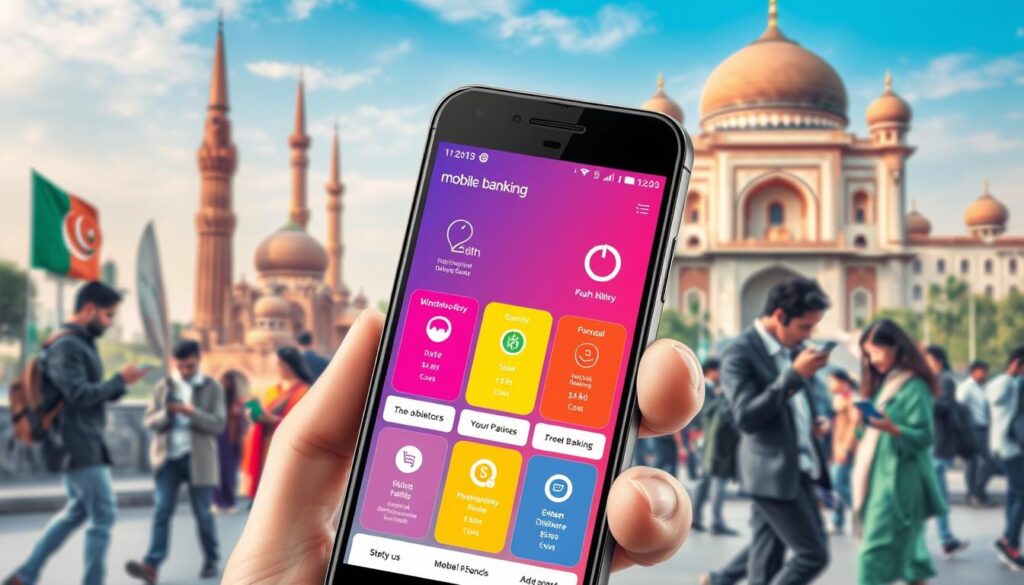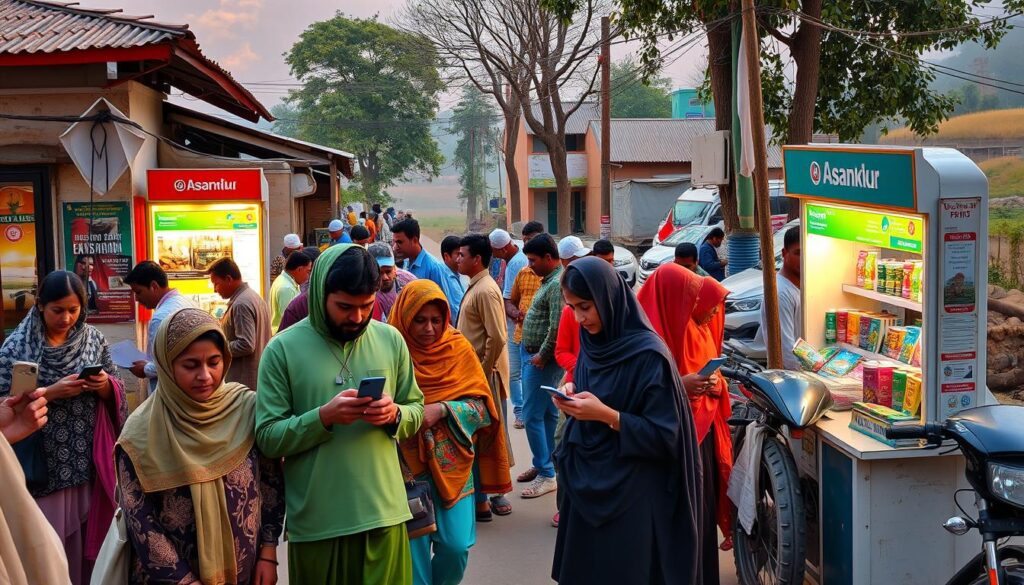Pakistan’s banking scene is changing fast, thanks to financial technology (fintech). Digital innovation is making a big impact. Fintech companies and banks are working together to change how we handle money.
Mobile banking apps are making banking easier and more accessible. They’re helping more people in Pakistan manage their money. Fintech is also making Islamic banking more available, meeting the needs of Pakistan’s Muslim population. Branchless banking is helping more people get financial services, even if they don’t have a bank account.
Fintech is changing how loans are given out. New ways of checking credit and lending money are being used. It’s also making sending money across borders easier and cheaper for workers and their families.
As fintech grows in Pakistan, it faces challenges and opportunities. Keeping customer data safe is a big concern. But, the government is helping by creating spaces for banks and fintech to work together. This is driving innovation in digital banking.
Key Takeaways:
- Fintech is changing banking in Pakistan, making mobile banking, Islamic finance, and branchless banking more common.
- Fintech is changing how loans are given out, with new ways to check credit and lend money.
- The fintech industry is making sending money across borders easier and cheaper.
- There are challenges like keeping data safe, but the government is helping banks and fintech work together.
- Pakistan’s fintech scene is set to grow, with digital innovation and the mix of traditional banking and fintech.
Introduction to Fintech in Pakistan
The fintech industry in Pakistan has grown a lot in recent years. It has changed the way banking and financial services work in the country. Fintech includes digital innovations in finance and is leading Pakistan’s digital finance change.
Several factors have shaped Pakistan’s fintech scene. These include more people using smartphones, more digital payments, and government support for financial inclusion. These changes have helped new fintech solutions emerge. They meet the financial needs of people and businesses all over Pakistan.
- Fintech in Pakistan has grown a lot, changing the banking and financial services industry.
- The fintech scene in Pakistan has been shaped by more smartphone use, digital payments, and government support for financial inclusion.
- These advancements have led to new fintech solutions. They address the financial needs of people and businesses in Pakistan.
Fintech in Pakistan has made finance more accessible. It has also helped more people, especially in rural areas, get financial services. Fintech companies use digital tech to reach more people. They offer financial services that were not available before.

As fintech in Pakistan keeps growing, it will be key in shaping the country’s financial future. The article will look at fintech’s impact on mobile banking, Islamic banking, branchless banking, and other financial innovations.
Mobile Banking Apps Reshaping Financial Accessibility
In Pakistan, mobile banking apps are changing how we manage money. They make banking easier for everyone, not just those who can go to a bank. These apps are a big step towards making money services available to all.
Key Features of Top Mobile Banking Apps
The best mobile banking apps in Pakistan have lots of useful features. You can manage your accounts, send money, pay bills, and use mobile wallets. Their easy-to-use design makes banking simple for people all over the country.
Adoption Rates and User Satisfaction
More and more people in Pakistan are using mobile banking apps. A recent study found that over 60% of Pakistani adults now use digital banking services, a significant jump from just a few years ago. People really like these apps, which shows how they’re changing banking for the better.
The rise of mobile banking apps is a big deal for financial inclusion and better user experience in digital banking services in Pakistan. As the country gets more digital, these apps will keep playing a key role in its financial future.

| Top Mobile Banking Apps in Pakistan | Key Features | Adoption Rates | User Satisfaction |
|---|---|---|---|
| Easypaisa |
|
45% | 4.5/5 |
| UBL Omni |
|
35% | 4.2/5 |
| JazzCash |
|
50% | 4.3/5 |
Islamic Banking and Fintech Synergies
In Pakistan, Islamic banking and fintech are changing finance. More people want Shariah-compliant finance. Fintech helps make Islamic banking services more accessible.
Fintech uses new tech to offer Islamic banking products. This includes mobile wallets and digital lending. It also includes crowdfunding and peer-to-peer financing. This digital transformation helps more people get financial services. It meets the needs of Muslim consumers who look for ethical finance.
The fintech integration makes Shariah-compliant processes easier. It uses digital tools and data analytics. This helps Islamic banking institutions manage risk and liquidity better.
| Fintech Integration Opportunities | Challenges in Islamic Banking-Fintech Synergies |
|---|---|
|
|
The fintech integration with Islamic banking offers big chances. But, there are challenges too. We must follow rules and keep data safe to offer Shariah-compliant finance well.
Despite these challenges, the partnership between Islamic banking and fintech in Pakistan is exciting. It could lead to more financial inclusion and innovation in finance.

Branchless Banking: Reaching the Unbanked
In today’s digital world, branchless banking has changed how people access money in Pakistan. Agent banking and mobile money platforms are key. They help bring financial services to those who don’t have bank accounts, making money more accessible to everyone.
Innovative Branchless Banking Models
Agent banking is a big step forward. It lets people in far-off places get financial help without going to a bank. They can deposit, withdraw, and send money, and even pay bills, all through agents.
Mobile money apps like EasyPaisa and JazzCash are also popular. They let users send money, buy airtime, and more, all from their phones. These apps make managing money easy and safe for those without bank accounts.
Impact on Financial Inclusion
- Increased accessibility to financial services in remote and rural areas
- Empowering the unbanked and underbanked segments of the population
- Streamlining and simplifying everyday financial transactions
- Promoting digital literacy and financial awareness
- Fostering economic growth and reducing poverty
Branchless banking has made a huge difference in Pakistan. It uses digital tech to reach more people. This has opened up new opportunities and improved lives, helping the economy grow.

Banking in Pakistan: Embracing Digital Transformation
The banking sector in Pakistan is changing fast. It’s all about digital banking and financial technology (fintech). Banks are investing in new tech to make banking better for everyone.
People in Pakistan want banking that’s easy and fits their lives. Young folks love mobile banking apps. They want to manage their money on their own terms.
Top banks in Pakistan are creating digital banking platforms. These platforms let you manage your account, make payments, and apply for loans online. They use fintech to make things smoother and cheaper.
But, there are hurdles to overcome. Banks face tough rules, security risks, and keeping customer data safe. Working together with fintech companies is key. It helps banks innovate and tackle these issues.
The future of banking in Pakistan looks bright. Customers will get more tailored, safe, and easy banking services. This will make Pakistan a big player in financial technology and banking innovation.
Fintech Solutions for Remittance Services
Pakistan’s remittance services are changing fast thanks to fintech. These new technologies make sending money abroad easier and cheaper. They help both people and businesses.
Streamlining Cross-Border Money Transfers
Fintech is changing how we send and get money across borders. It uses digital wallets, mobile apps, and blockchain. This makes sending money faster, cheaper, and clearer.
Now, you can send money straight to mobile wallets or bank accounts. No need for cash pickup spots. This is why more young people are using these services.
Regulatory Challenges and Opportunities
Fintech has brought new rules to the remittance world. It’s important to follow anti-money laundering (AML) and know-your-customer (KYC) rules. This keeps the financial system safe.
Regulators in Pakistan are finding ways to help fintech grow. They’re creating spaces for startups to test and work with old banks. This helps both sides grow together, helping users more.
The fintech world in Pakistan is growing fast. This means remittance services could get better, more open, and safe. Technology is key to making money transfers easier for millions in Pakistan.
The Rise of Microfinance and Fintech Collaborations
In Pakistan, microfinance and fintech have joined forces, sparking a financial inclusion revolution. Microfinance institutions have long provided credit and financial services to those in need. But fintech has boosted their reach and impact, creating a powerful synergy.
Fintech partnerships have helped microfinance groups use digital solutions. This has made their work more efficient and reached more people. Mobile banking, biometric tech, and new credit scoring models are key to this success.
| Microfinance Institutions | Fintech Collaborations | Key Benefits |
|---|---|---|
| Kashf Foundation | Telenor Pakistan | Increased outreach to unbanked communities, digitalized loan disbursement and repayment processes |
| Aga Khan Development Network | Easypaisa | Expanded access to microloans and mobile savings accounts, streamlined financial service delivery |
| Akhuwat Foundation | JazzCash | Innovative collateral-free lending models, seamless digital loan applications and repayments |
These fintech partnerships are boosting financial inclusion and helping SMEs in Pakistan. They offer alternative lending and digital financial tools. This helps SMEs overcome credit barriers and grow.
The future looks bright for microfinance and fintech in Pakistan. These alliances have huge potential for financial inclusion and supporting entrepreneurship. They are set to bring economic empowerment and prosperity to underserved communities.
Consumer Lending: Fintech’s Disruption of Traditional Models
Fintech has changed the way we borrow money in Pakistan. New fintech companies use different ways to check if you can pay back a loan. This helps people and small businesses get credit who were ignored by old banks.
Alternative Credit Scoring and Risk Assessment
Fintech companies in consumer lending are using new data like social media and mobile use. They look at e-commerce too. This lets them help more people, even those with no credit history.
They use smart data tools to make better risk assessment models. This means they can lend to people and small businesses that old banks wouldn’t touch.
Peer-to-Peer Lending Platforms
Peer-to-peer (P2P) lending platforms have also changed the game in Pakistan. They connect lenders directly with borrowers, skipping the middlemen. This fintech disruption brings better rates, quicker loans, and more access for everyone.
| Metric | Traditional Banks | Fintech Lenders |
|---|---|---|
| Average Loan Approval Time | 7-10 days | 2-3 days |
| Interest Rates | 12-18% | 8-14% |
| Credit Assessment | Conventional Credit Scoring | Alternative Credit Scoring |
The table shows how fintech is different from old banks in consumer lending. It shows fintech’s big impact.
The fintech disruption is changing consumer lending in Pakistan. Old banks must now use new tech and data to stay competitive.
Challenges and Regulatory Landscape for Fintech in Pakistan
Fintech in Pakistan is growing fast, but it faces unique challenges. A balanced approach to regulation is needed. Key concerns are cybersecurity and data privacy, which are top priorities for fintech companies and policymakers.
Cybersecurity and Data Privacy Concerns
Digital technologies and sensitive financial data are increasing. This makes cybersecurity crucial. Fintech firms must invest in security and work with regulators to protect customer data.
Data privacy is also a big issue. Fintech services need personal and financial details. Creating strong data protection and following privacy rules is key to gaining consumer trust.
Regulatory Initiatives and Sandboxes
- The Pakistani government is supporting fintech with several regulatory initiatives.
- Regulatory sandboxes have been set up for fintech startups. They can test their products in a controlled environment.
- These regulatory sandboxes help regulators make policies that fit the fintech industry’s needs.
As fintech and regulations evolve, finding the right balance is vital. This balance is crucial for the fintech sector’s growth in Pakistan.
| Key Fintech Challenges | Regulatory Initiatives |
|---|---|
| Cybersecurity | Establishment of regulatory sandboxes |
| Data privacy | Developing data protection frameworks |
| Compliance with evolving regulations | Agile policymaking to accommodate industry needs |
Partnerships and Collaborations: Banks and Fintechs
The financial services industry in Pakistan is changing fast. Banks and fintech companies are working together. This teamwork is bringing new ideas and changing how we handle money.
Open Banking and API Integration
At the center of these partnerships are open banking and APIs. Banks and fintechs use open APIs to share data and services easily. This makes things better for customers and helps both sides grow.
Success Stories of Bank-Fintech Collaborations
Pakistan has many success stories from these partnerships. For example, Bank Alfalah and Finja have created new digital banking solutions. These solutions have made it easier for people in rural areas to access money.
UBL Bank and Oraan have also done great work. They have made special products for women. These products help women manage their money better.
| Bank | Fintech Partner | Collaboration Highlights |
|---|---|---|
| Bank Alfalah | Finja | Developed digital banking solutions to improve financial inclusion and accessibility |
| UBL Bank | Oraan | Launched innovative lending products and financial management tools for female customers |
These partnerships show how bank-fintech partnerships, open banking, and API integration can change the financial world in Pakistan. They lead to successful collaborations that help everyone.
Future Trends and Opportunities in Pakistan’s Fintech Ecosystem
The fintech industry in Pakistan is set for big growth. This is thanks to new technologies and creative financial solutions. As the country goes digital, the fintech scene is full of chances for businesses, consumers, and the financial world.
Digital currencies and blockchain technology are changing the game in Pakistan. They can make sending money across borders easier and safer. The government’s support for these technologies will help more people get into the financial system.
Artificial intelligence (AI) and machine learning are also making waves in fintech. They can make credit checks more accurate and help with financial tasks. This means better services for everyone.
| Fintech Trend | Potential Impact |
|---|---|
| Digital Currencies | Streamlining cross-border transactions, promoting financial inclusion |
| Blockchain Technology | Enhancing the security and transparency of financial operations |
| Artificial Intelligence | Improving credit assessments, automating financial processes, and providing personalized financial guidance |
Pakistan needs to keep supporting fintech with good rules and investment in new tech. This will make it a key player in fintech innovation. It will also attract global investors and grow the financial sector.
“The future of Pakistan’s fintech ecosystem lies in embracing cutting-edge technologies and creating a collaborative environment for innovation.”
The fintech scene in Pakistan is getting better, offering chances to include more people in finance. By using fintech trends and emerging technologies, Pakistan can lead in financial innovation. This will secure a bright future for its fintech industry.
Conclusion
The rise of fintech in Pakistan has changed the banking world. It has made banking services more accessible to everyone. This digital shift has brought new ways to manage money and has helped more people get financial services.
Mobile banking apps have made it easier for people to use banking services. Islamic banking and fintech have also worked together. This has made the financial services in Pakistan much better.
Branchless banking has helped more people get bank services. It has made banking available to those who didn’t have it before. Fintech has also made sending money across borders easier. This is a big help for migrant workers and their families.
The future of fintech in Pakistan looks bright. Banks and fintech companies are working together more. New lending platforms and rules to encourage innovation are coming. Pakistan is moving forward in using digital finance, which will help everyone.
FAQ
What is the role of fintech in transforming the banking landscape in Pakistan?
Fintech, or financial technology, is changing Pakistan’s banking and finance world. It’s making the industry more modern. The article talks about how fintech is growing in Pakistan and what’s driving it.
How are mobile banking apps reshaping financial accessibility in Pakistan?
Mobile banking apps are changing how people access money in Pakistan. They offer features like managing accounts and making payments. The article looks at the top apps and how people are using them.
What is the relationship between Islamic banking and fintech in Pakistan?
Islamic banking and fintech are working together in Pakistan. Fintech helps offer Islamic finance services. The article talks about how this partnership is helping more people get financial services.
How is branchless banking impacting financial inclusion in Pakistan?
Branchless banking is making more people in Pakistan have access to financial services. It includes things like agent banking and mobile money. The article looks at how these services are helping the unbanked.
What are the key initiatives taken by banks in Pakistan to embrace digital transformation?
Banks in Pakistan are going digital. They’re using fintech and updating their systems. The article talks about their efforts to give customers a better online experience.
How is fintech transforming the remittance services landscape in Pakistan?
Fintech is making sending money across borders easier and cheaper in Pakistan. The article looks at how fintech is changing remittances. It also talks about the challenges and opportunities in this area.
What is the impact of fintech on microfinance in Pakistan?
Fintech is helping microfinance grow in Pakistan. It’s making it easier for people to get loans and financial services. The article talks about how fintech is helping small businesses and communities.
How is fintech disrupting traditional consumer lending models in Pakistan?
Fintech is changing how people get loans in Pakistan. It’s using new ways to check credit and assess risk. The article looks at how fintech is offering loans to individuals and small businesses.
What are the key challenges and regulatory initiatives facing the fintech industry in Pakistan?
The fintech industry in Pakistan faces challenges like cybersecurity and data privacy. The article talks about the efforts to balance innovation with oversight. It looks at regulatory initiatives and sandbox programs.
How are banks and fintech companies collaborating in Pakistan?
Banks and fintech companies in Pakistan are working together more. They’re using open banking and APIs to share data and services. The article highlights successful partnerships and their impact on the industry.
What are the future trends and emerging opportunities in Pakistan’s fintech ecosystem?
The future of fintech in Pakistan looks promising. The article talks about how new technologies like blockchain and AI will change the industry. It also looks at areas for growth and how to support the fintech ecosystem.
- Introduction to Fintech in Pakistan
- Mobile Banking Apps Reshaping Financial Accessibility
- Islamic Banking and Fintech Synergies
- Branchless Banking: Reaching the Unbanked
- Banking in Pakistan: Embracing Digital Transformation
- Fintech Solutions for Remittance Services
- The Rise of Microfinance and Fintech Collaborations
- Consumer Lending: Fintech's Disruption of Traditional Models
- Challenges and Regulatory Landscape for Fintech in Pakistan
- Partnerships and Collaborations: Banks and Fintechs
- Future Trends and Opportunities in Pakistan's Fintech Ecosystem
- Conclusion
- FAQ
